August 16, 2014
by Carole Zangari -
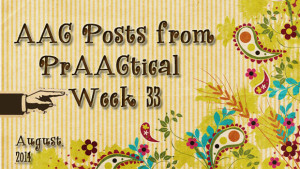
Sunday-Video of the Week: Teaming Up for AT Assessments Monday-See the Student Tuesday-Research Tuesday: Supporting Children with Severe and Profound Multiple Disabilities Wednesday-Watch It Wednesday: Towards an Inclusive Maker Movement Thursday-PrAACtical Questions: “Should I Put Yes/No on an SGD?” Friday-Supporting Communication Development in Children with Vision and Hearing Impairments
Filed under: PrAACtical Thinking
August 15, 2014
by Carole Zangari -
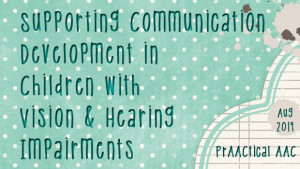
If you are new to working with young children who have both hearing and vision loss, this resource is for you. It is challenging it to complete meaningful assessments and to use those data to design effective interventions. This resource guide, edited by Dr. Charity Rowland, has wonderfully prAACtical information. In addition to the general content, there is specific information for SLPs, special educators, psychologists, and families. https://www.livebinders.com/media/get/NTEzMDI3OA==
Filed under: PrAACtical Thinking
Tagged With: beginning communicator, Charity Rowland, deafblind, hearing impairment, vision impairment
August 14, 2014
by Carole Zangari -
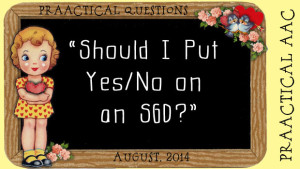
We got this question from an SLP who recently helped a young adult get funding for a speech generating device (SGD): Should we put symbols for yes and no on the student’s communication device? Like other things in clinical practice, it depends of the specifics of the situation. In this case, she wanted to start out with a very small vocabulary set and build gradually. That sure makes sense, but where she got stuck was with which specific words to include. Team members were encouraging her to include yes and no, hence the question. There is no one-size-fits-all answer for this. Here are some things we think about in making that decision for and with an AAC learner. Does he/she have another way to say yes/no? If so, then this may not be the best use of the limited ‘real estate’ on the learner’s SGD. In the case of this... [Read More...]
Filed under: PrAACtical Thinking
Tagged With: PrAACtical Questions, yes no
August 13, 2014
by Carole Zangari -
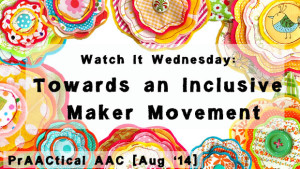
Where we live, the DIY movement has impacted everything from home repairs, to decorating, to assistive technology. We love the idea of empowering clients, families, and professionals to take things into their own hands to make, adapt, use, and share. Take a look at Meryl Alper’s Ignite session on the topic of building an inclusive maker culture.
Filed under: PrAACtical Thinking
Tagged With: assistive technology, community, DIY, inclusion, Meryl Alper
August 12, 2014
by Carole Zangari -
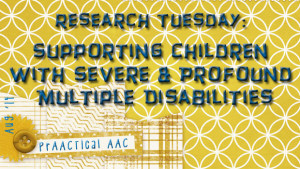
What do we know about the best ways to provide communication support to individuals with severe and profound multiple disabilities (PMLD)? PMLD is a term that generally refers to people who experience profound cognitive limitations in addition to sensory and/or physical disabilities. Many of these individuals have complex medical histories and chronic health concerns. Often, the communication difficulties experienced by individuals with PMLD cause them to be isolated and excluded from many social and educational opportunities. Despite their many challenges, there is evidence to suggest that AAC supports can help these children develop their communication skills. Not much is known, however, about how to structure the AAC intervention to maximize learning. In this study, Harding and her colleagues sought to reduce isolation and promote personal autonomy by providing AAC supports to two children with PMLD. As other researchers have demonstrated the positive impact of AAC on people with PMLD, this... [Read More...]
Filed under: PrAACtical Thinking
Tagged With: Harding, intervention, PMLD, Research Tuesday
August 11, 2014
by Carole Zangari -
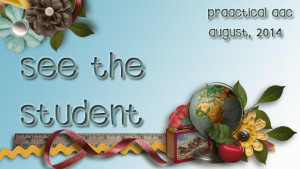
No excuses.
Filed under: PrAACtical Thinking
August 9, 2014
by Carole Zangari -
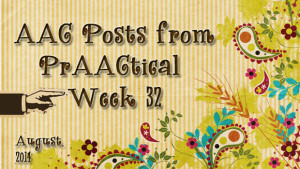
Sunday – Video of the Week: Augmented Input with Dr. Jill Senner Monday – Communication Opportunities Tuesday – 5 AAC Handouts from ISAAC 2014 Wednesday – Watch It Wednesday: Eye Gaze Research Thursday – Learn by Listening with Chris Bugaj Friday – A PrAACtical Tool for Emergencies and Accidents
Filed under: PrAACtical Thinking
August 8, 2014
by Carole Zangari -
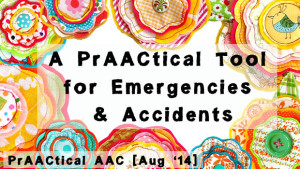
Jonah fell off the monkey bars in his after school program and broke his wrist. Just another childhood experience unless you are nonverbal. Melinda had a significant seizure on a public bus. It’s great that she is independent, but what happens when no one who knows her can communicate with the ambulance staff? Accidents, injuries, and emergencies are part of everyday life. We don’t plan on them. We think they will never happen. Or, we don’t think about them at all. We’re just too busy. Until today. Let’s make this the day that we sit down and take the time to provide a safeguard for our clients. Widget Health’s Accident and Emergency Passport will help others know how to assist people with communication difficulties.
Filed under: PrAACtical Thinking
Tagged With: accident, communication passport, Emergency
August 7, 2014
by Carole Zangari -
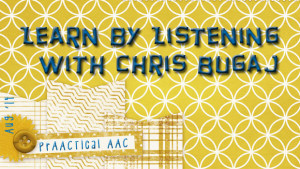
AAC professionals seem to love professional development. Unfortunately, there just never seems to be enough time to indulge our love for learning about new technologies and strategies. Sound familiar? Well, Chris Bugaj has been a solution worth listening to. Chris is an SLP and a founding member the Assistive Technology Team for Loudoun County Public Schools. He hosts The A.T.TIPSCAST , a multi‐award winning podcast featuring strategies useful in differentiating the learning experience. Chris is the co‐author of The Practical (and Fun) Guide to Assistive Technology in Public Schools and ATEval2Go, and has two chapters in Technology Tools for Students with Autism. Chris co‐produces and co‐authors the popular Night Light Stories podcast which features original stories for children of all ages. Today, we share his wonderful presentation (complete with hyperlinks) that will help us to learn how to use podcasts to learn while we’re driving, exercising, or just hanging out. If you’ve thought about maximizing your learning opportunities by listening... [Read More...]
Filed under: PrAACtical Thinking
Tagged With: Chris Bugaj, PD, professional development
August 6, 2014
by Carole Zangari -
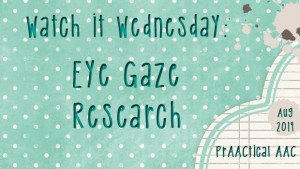
Today, we’ll take a look at a collaborative effort by researchers at University College London (Department of Developmental Science), Great Ormond Street Hospital for Children (Neurodisability Service), and Barnsley Hospital. These researchers are investigating the eye gaze patterns of children with cerebral palsy who have little or no functional speech. Could tracking eye movements be a useful way to assess language skills? This is a line of research we will be watching. Direct Link: http://www.ucl.ac.uk/gaze
Filed under: PrAACtical Thinking
Tagged With: collaboration, eye gaze, research









